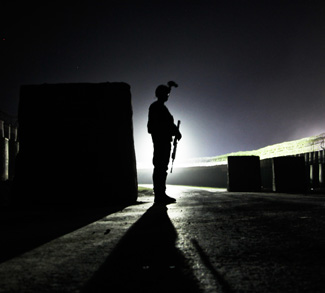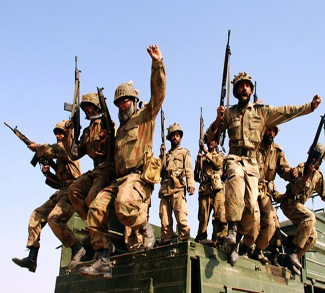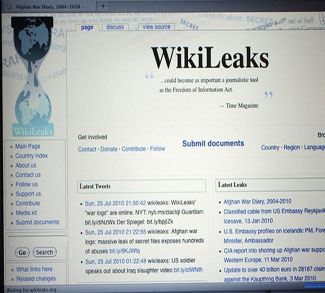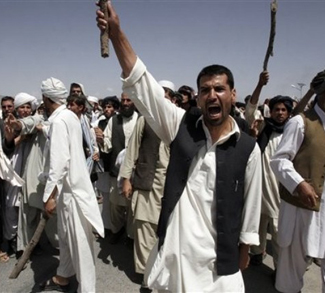FORECAST
This week’s drama concerning General McChrystal is just one of many signs pointing to trouble for NATO forces in Afghanistan.
Though fragile at the best of times, political support for the war in Afghanistan has been tested this past month, as most quantitative benchmarks indicate spiraling violence. According to a UN report, roadside bombings have increased by 94 percent during the first four months of the year, and that doesn’t even scratch the surface. Assassinations have also spiked by an alarming 45 percent- with high-profile government officials consistently being targeted- and coordinated attacks have doubled against last year’s average. As more US troops put their boots on the ground throughout the course of the summer, they will be entering into a situation that is clearly deteriorating.
There are also signs to indicate a lack of progress on strengthening Afghan political institutions. Corruption still seems to be the order of the day, as a recent congressional report has explicitly pointed out. According to the report, US taxpayer money is being funneled through Afghan private security firms and into the pockets of warlords. In exchange, convoys carrying supplies for NATO troops get safe passage through a given warlord’s domain. The total amount of money being spent this way is staggering: a reported $4 million per week.
The dynamic on the ground makes the McChrystal scandal all the more damaging to the Obama administration and by extension any wider political support for the Afghan campaign. With spiraling violence and an extremely short window for the troop surge (a stated withdrawal of June 2011), the Obama administration is left with few options. Expect the June 2011 date to be scrapped with the possibility of General McChrystal serving as a sacrificial lamb for an Afghan policy that is clearly failing.
What is clear is that the lack of progress and obvious divisions in Washington will serve to scuttle attempts to bring the Taliban into the legitimate political fold in Afghanistan. To effectively do so would require a Taliban movement that has been pushed into a corner. In reality, the opposite is true. Taliban leaders are well aware that political pressure is mounting against the NATO mission and episodes like the McChrystal affair serve as excellent propaganda victories. At this point it is far more ideal for the Taliban to keep donning the garb of nationalism, wait until the majority of NATO forces have been withdrawn, and then move against a government that will always have a legitimacy problem owning to its origins.
While it is possible that the surge could start to bear fruit in the form of declining attacks, the time and resources required to properly stabilize the current government of Afghanistan will not be forthcoming. Thus, expect the Taliban to remain on the fringe of Afghan politics until the NATO mission has ended. What’s less clear is which political careers will be cut short in Washington.
SUMMARY OF EVENTS: June 14th – June 21st, 2010
NORTH AMERICA
United States
Oil giant BP is to put $20bn (£13.5bn) in a compensation fund for victims of the Gulf oil spill and will not pay shareholders a dividend this year.
BP chief executive Tony Hayward has been told by an angry US Congressional panel his firm ignored dangers when drilling in the Gulf of Mexico.
The U.S. State Department has issued a travel alert to Americans planning to go to Toronto next week, warning of potential demonstrations and increased security during the Group of 20 summit.
A Deepwater Horizon rig worker has told the BBC that he identified a leak in the oil rig’s safety equipment weeks before the explosion.
Mexico
Mexican President Felipe Calderon has made a nationwide appeal for public support as the government battles to control drug-related violence.
WESTERN EUROPE
European Union (EU)
European Union leaders have approved a new set of sanctions against Iran that go further than the latest United Nations measures.
Netherlands
A Dutch court has sentenced five Somali men to five years in prison for attacking a cargo ship in the Gulf of Aden last year, in the first such case to come to trial in Europe.
Spain
Spain paid an increased risk premium at a debt auction on Tuesday, after having had to deny German media reports that it may soon be the next euro zone state to need a Greek-style bailout.
Ireland
The Irish Republic is to expel an Israeli diplomat over the use of fake passports in the killing of a Hamas official in Dubai.
EASTERN EUROPE
Turkey
Turkey has sent hundreds of troops into northern Iraq to chase fighters from the Kurdistan Workers’ Party (PKK) in an operation likely to increase tensions within the region.
Russia
Russia’s state-controlled gas monopoly Gazprom has started to cut supplies to neighbour Belarus over its debt after Russian President Dmitry Medvedev ordered the reduction.
MIDDLE EAST
Israel
Measures are in place for the increase in road shipments to the Gaza Strip following Israel’s decision to change the conditions of its blockade of the Palestinian enclave.
Israel said Sunday it was easing a land blockade on the Gaza Strip to allow in all goods except for arms and materials used to make them.
Israel has announced it will ease its blockade of the Gaza Strip and allow more civilian goods to enter the Palestinian territory.
This month marks three years since the militant Islamic group Hamas seized control of the Gaza Strip. The event led Israel to impose a blockade on Gaza. Israel’s goal was to prevent weapons and other materials that could be used for weapons from entering the Gaza Strip. But it was also to pressure and topple Hamas, which is backed by Iran and whose charter calls for the destruction of the Jewish state. The recent attack by Israeli commandos on a flotilla carrying aid and activists to Gaza has drawn attention to the blockade. Within Israel, questions are being asked about whether it has been effective.
Iran
The United States is expanding its sanctions on Iran because of concerns about its nuclear ambitions.
Iraq
The United States will be leaving a toxic brew of hazardous waste behind when US forces withdraw from Iraq, a new report says.
SOUTH ASIA
Afghanistan
The United Nations has agreed to remove Taliban members who renounce ties to al Qaeda from a U.N. blacklist on a “gradual” basis, Afghan President Hamid Karzai’s office said on Tuesday.
US Defense Secretary Robert Gates rejected suggestions Sunday that US forces will move out of Afghanistan in large numbers in July of next year under a deadline set by President Barack Obama.
Bangladesh
Increased defense cooperation will be among the topics discussed when Chinese Vice President Xi Jinping visits Bangladesh, Foreign Minister Dipu Moni said on Sunday.
CENTRAL ASIA
Kyrgyzstan
Angry protesters confronted Kyrgyzstan’s interim leader Roza Otunbayeva Tuesday as authorities pushed forward with plans for a constitutional referendum despite deadly ethnic clashes.
EAST ASIA
China
Policymakers in the world’s major economies will closely monitor the Chinese yuan this week for signs it is actually moving after Beijing announced it would make its exchange rate more flexible.
AFRICA
Starving people in drought-stricken west Africa are being forced to eat leaves and collect grain from ant hills, say aid agencies, warning that 10 million people face starvation across the region.




